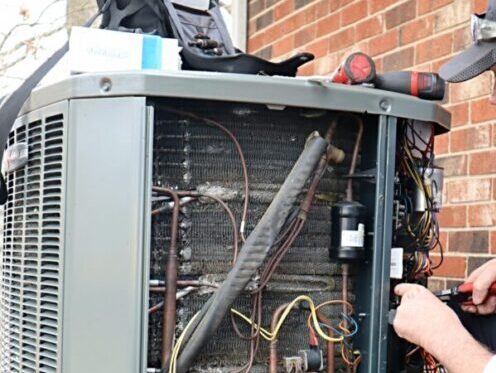The typical AC cooling cycle lasts between 15 and 20 minutes. If your Greensboro, North Carolina home is on the smaller side, your AC cooling cycles might last just 10 minutes. When air conditioners cycle on and then rapidly cycle back off, this is a sign of problems. Cooling cycles that last under five minutes are an indication of airflow issues, wiring problems, dirty evaporator coils, and more. Also known as short cycling, this manner of functioning can drive your home energy bills up even as it decreases your indoor comfort. Worse still, if left unchecked, it can also lead to unit failure requiring an AC repair. The following are six common causes of AC short cycling along with tips for troubleshooting them.
1. Dirty Air Filters
Whenever air conditioners suddenly stop performing like they should, the first thing to check is their air filters. Dirty air filters lie at the heart of countless AC problems. Although these components are small, low in cost, and easy to swap out, they have a major hand in determining just how well cooling systems work.
Air conditioners cool homes down via heat transfer. They draw warm air from the building interior, pass this air over refrigerant-filled evaporator coils, and then send it back into the living environment after its heat has been absorbed. When drawing warm air in, air conditioners pull this air through their filters to sieve out hair, pollen, dander, dirt, and other particulates. This keeps their interior components clean and offers a limited range of indoor air quality (IAQ) benefits.
Thick accumulations of particulate matter gradually clog the mesh of HVAC air filters. When these build-ups become too thick and too heavy, air conditioners have a hard time moving air through them. As a result, their fan motors and many other components have to draw more energy and work a lot harder. These changes in functioning cause air conditioners to overheat. To protect themselves from permanent, heat-related damage, air conditioners cycle off before their moving parts become too hot. As soon as the affected components cool down, air conditioners cycle back on. This pattern will continue until the dirty air filter is replaced and normal airflow is restored.
To stay on top of filter changes and avoid problems with short cycling, make a habit of checking this component each month. Most households require AC filter changes every 30 to 60 days. However, if you use your air conditioner infrequently and don’t have any major IAQ concerns, you may only need to change your AC filter just once every 60 to 90 days.
2. Freezing at the Evaporator Coil
The primary role of an air filter is to keep an air conditioner’s interior components clean. Without a clean filter in place, all of the dirt and other debris that gets drawn into your cooling system would land on sensitive features like your AC’s evaporator coil.
When warm air passes over the AC evaporator coil, the chilled refrigerant it contains absorbs its heat. Unfortunately, if this coil is covered in grime, heat transfer cannot occur. The same frosty refrigerant that’s meant to cool your indoor air will wind up freezing your evaporator coil instead.
Evaporator coils are professionally cleaned during annual AC tune-up service. If you neglected to schedule this service before the cooling season arrived, now is the time to do it. If your AC has already had its annual tune-up, running this unit with a dirty filter might have left the evaporator coil in need of additional maintenance.
3. Refrigerant Leaks
Irrespective of the underlying cause, short cycling is often a protective measure. It’s an indication that certain AC components are overheating or being overworked. If your air filter and evaporator coil are clean, the problem may lie with your refrigerant. This highly pressurized coolant is the lifeblood of the cooling process.
In older air conditioners, corroded refrigerant lines and other wear can cause this coolant to seep out. This leaves the AC compressor working harder than normal to pressurize an increasingly limited amount of refrigerant and pump it throughout the system. By rapidly cycling off before the resulting stress becomes overwhelming, your air conditioner is preventing permanent compressor damage. If you suspect that a refrigerant leak is the cause of your short cycling, turn the unit off and call for service right away.
4. Electrical Problems
Short cycling can also be the result of a damaged or failed AC capacitor. This component functions quite a bit like a battery. It harnesses power and stores it so that the AC compressor motor has the fuel it needs at the start of each cooling cycle. When air conditioners cycle on, they use more electricity than what’s readily available through the normal power supply. Lacking the energy reserves provided by the AC capacitor, air conditioners have a hard time both initiating cooling cycles and completing them.
Your air conditioner might have two separate capacitors: a start capacitor and a run capacitor. The start capacitor provides a massive jolt of energy at the beginning of the cooling cycle, and the run capacitor provides enough juice to keep the cooling cycle going. Newer ACs have dual capacitors that handle both jobs. Although these components can last up to 20 years, excessive heat, high levels of humidity, and frequent AC use can cause them to break down prematurely.
5. Incorrect AC Sizing
There are many good reasons to have a licensed HVAC company choose the right air conditioner size for your home. Seeing deep discounts on home cooling systems while shopping online or traveling through big box stores often tempts homeowners to make these important purchasing decisions on their own. Unfortunately, no matter how low an air conditioner’s upfront price may be, it will always provide substandard service and less than impressive returns if it’s too big for your home. Even the most efficient air conditioners will use massive amounts of energy and consistently under-perform if they aren’t correctly sized for their service areas.
Under-size air conditioners run constantly. These units lack adequate cooling power for cooling down the homes that they’re installed in. Conversely, oversize air conditioners cycle on and then quickly turn back off. They work intensely for three to five minutes and then immediately shut down. If your air conditioner has always short cycled since the day it was installed, incorrect sizing is the most likely cause.
6. Incorrect Thermostat Placement
The location of your thermostat can also play a hand in causing short cycling. Thermostats should be positioned far away from external heat sources like ovens, large windows, gaming computers, and clothes dryers. Although these devices are increasingly sophisticated, they’re still subject to false readings due to residual heat or drafty conditions in their immediate areas. If your AC short cycling started after a new heat-generating appliance was added to your home or after your thermostat was moved, you may need to relocate your thermostat or take measures to shield it from external heat sources and cold drafts.
Residents of Greensboro, North Carolina can count on us for superior heating, cooling, and plumbing services. We also provide first-rate roofing and electrical services, and affordable preventative maintenance plans. If your air conditioner is short cycling, contact Aurora Pro Services Heating, Air, Plumbing, Electrical, & Roofing today to schedule an appointment.






